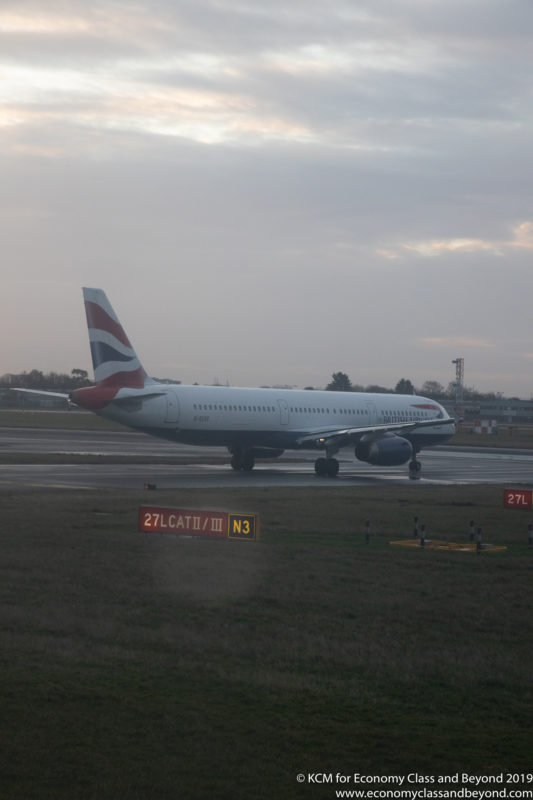It’s a step-by-step process, but airlines are working towards being “greener”.
In British Airways case, it has started to offset the carbon emissions for all UK domestic flights, as part of its plan to work towards achieving net zero carbon emissions by 20202.

British Airways Airbus A321 preparing to set off – Image, Economy Class and Beyond.
For passengers on the UK Domestic network, British Airways will have the carbon emissions from their flights offset by the airline and invested in what they call “the highest quality, verified carbon reduction projects around the world”.
According to the airline these will include quality assured projects such as renewable energy, protection of rainforests and reforestation programmes.
The carbon offsetting applies to flights connecting London to Manchester, Leeds, Newcastle, Isle of Man, Edinburgh, Glasgow, Aberdeen, Belfast City, Inverness and Jersey, covering 75 flights a day in a normal flying programme
As part of its plan to achieve net zero carbon emissions by 2050 – the airline is planning to use a through a range of initiatives, including offsetting emissions on all flights within the UK, flying more fuel-efficient aircraft, investing in sustainable aviation fuel and changing operating procedures.
In addition, the airline and its parent company IAG, will invest a total of $400m on alternative sustainable fuel development over the next 20 years.
In quotes
Alex Cruz, British Airways’ Chairman and Chief Executive, said:
“We know that air travel continues to grow, but we also know that our future has to be sustainable. Solving the complex issue of climate change requires a multifaceted response, and offsetting emissions on all flights within the UK is just one step that we are adopting to reduce our environmental impact while more solutions to decarbonise are found. Our emissions reductions projects are carefully chosen to ensure they are proven and deliver real carbon emissions reductions as well as economic, social and environmental benefits.
Beyond the UK
If you’re travelling beyond the UK Domestic network, you’ll be able to use a tool during booking to offset the carbon emissions of your flight. The airline estimates that London to Madrid would cost £1 extra, whilst London to New York in business class would cost around £15.
This charge is currently optional. The tool will enable you to missions and make their flight carbon neutral by choosing from the highest quality, verified carbon reduction projects in Peru, Sudan and Cambodia through its partnership with not-for-profit charity Pure Leapfrog.
Not the first, but a welcome move
Carbon offsetting has been offered by airlines on and off for some years – with the majority of schemes being optional to partake in.
Most notable was SilverJet – an all business airlines – that included a carbon offset in its fare from day one (until Air Passenger Duty came in and made it optional).
As airlines attempt to find solutions to the carbon emissions they emit and work towards reducing waste, it’s welcome to see British Airways take positive action on their domestic network to at least offset the emissions.
Hopefully, other airlines will follow and start adding carbon offsets as part of their environmental strategies.
Welcome to Economy Class and Beyond – Your no-nonsense guide to network news, honest reviews, with in-depth coverage, unique research as well as the humour and madness as I only know how to deliver.
Follow me on Twitter at @EconomyBeyond for the latest updates! You can also follow me on Instagram too!
Also remember that as well as being part of BoardingArea, we’re also part of BoardingArea.eu, delivering frequent flyer news, miles and points to the European reader.
The sole purpose of this is to get the sheeple normalized to the idea of “green taxation” for their flights by employing a gradual strategy like that in the “boiling frog” fable.
The first step is to make everyone see this low, optional fee every time they buy a ticket. Meanwhile the collective media will clamor about how the program is great, but more needs to be done. Then when the government inevitably takes the next step and implements a real “green tax” there is less of an adverse reaction than there would have been had it all been done at once.